Indication
This formula was originally recorded in the Formulary of the Tai Ping Welfare Dispensary Bureau (tai ping hui min he ji ju fang) (1151 CE), a compilation of popular and effective formulas that were used in the public dispensaries of the Song dynastic period. It is a well designed formula with a mild and balanced action that may be taken by all age groups for prolonged periods without adverse effect.
This is especially pertinent as it aims to treat retained Damp, which is a pathogen that tends to be slow to resolve. Weakness of the Spleen Qi may lead to failure of the astringing action of the Qi, resulting in loose stools or diarrhoea. In addition, failure of the Spleen’s transportation function may lead to stagnation of the fluid passages, resulting in disordered fluid metabolism and the retention of Damp.
This also manifests clinically with loose stools (together with a greasy white tongue coat). Because the Damp is generated and hence also retained in the middle Jiao, it causes stagnation of the Qi, both in this location and also in the Lung – as the pathology is transmitted via the promotion (sheng) relationship amongst the five phases.
This leads to impaired digestion, a sensation of oppression in the chest (due to the stagnation of the Lung Qi), and possibly also nausea or vomiting. In order to address these pathologies, this formula contains a mixture of Qi tonifying, Damp dispelling, astringent and Qi regulating herbal ingredients.
Several of the ingredients have been specially pre-prepared to enhance their therapeutic actions: Atractylodes (bai zhu), Coix (yi yi ren), Dolichos (bian dou) and Dioscorea (huai shan yao) have been dry-fried so that they may effectively tonify the Spleen Qi while also drying Damp and astringing the Intestines.
The synergistic actions of the herbs are as follows:
Codonopsis root (dang shen), Atractylodes rhizome (bai zhu), Poria cocos (fu ling), Dioscorea root (huai shan yao), Dolichos seed (bian dou), Ziziphus fruit (da zao): tonify the Spleen Qi.
Atractylodes rhizome (bai zhu), Poria cocos (fu ling), Coix seed (yi yi ren), Dolichos seed (bian dou): tonify the Spleen Qi and drain Damp.
Dioscorea root (huai shan yao), Dolichos seed (bian dou), Nelumbo seed (lian zi), Coix seed (yi yi ren): tonify the Spleen Qi and astringe the Intestines to stop diarrhoea.
Platycodon root (jie geng), Amomum fruit (sha ren): regulate the Qi of the Lung and middle Jiao respectively.
Indications:
Chronic gastroenteritis
Chronic ulcerative colitis
Crohn’s disease
Gastritis
Duodenitis
Anaemia
Malabsorption syndrome
Malnutrition
Leucorrhoea
Peptic ulcer disease
Chronic fatigue syndrome
General debility
Diabetes mellitus
Side effects of chemotherapy
Signs & Symptoms:
Loose stools or diarrhoea
Poor appetite and digestion
Weight loss or emaciation with inability to gain weight
Fatigue
Muscular weakness
Pale or sallow complexion with little lustre
Nausea or vomiting
Oppressive sensation in the chest
Abdominal discomfort or mild pain
White or watery leucorrhoea
Pale tongue with a greasy white coat
Weak pulse that may also be thready or moderate
Combinations –
Anorexia in children:
BAO HE WAN
Diarrhoea, chronic:
FU ZI LI ZHONG WAN (jia Wei)
Diarrhoea, early morning:
YOU GUI WAN
FU ZI LI ZHONG WAN (jia Wei)
Indigestion, Spleen Qi deficiency:
BAO HE WAN
JIAN PI WAN
Irritable bowel syndrome:
BU ZHONG YI QI WAN
CHAI HU SHU GAN WAN
HUO XIANG ZHENG QI WAN
FU ZI LI ZHONG WAN (jia Wei)
Irritable bowel syndrome, severe diarrhoea:
BU ZHONG YI QI WAN
Malabsorption syndrome (Spleen Qi deficiency):
BU ZHONG YI QI WAN
Malabsorption syndrome (with turbid Damp):
HUO XIANG ZHENG QI WAN
TCM Syndromes: Spleen-Stomach Qi deficiency, Stagnation of Damp in the middle Jiao.
TCM Actions: Tonifies the Spleen Qi, harmonises the middle Jiao, drains Damp and alleviates diarrhoea.

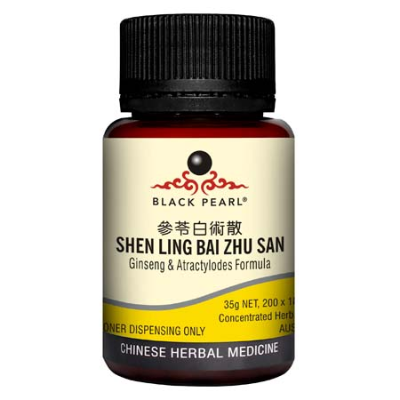
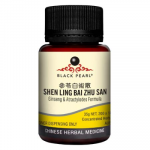

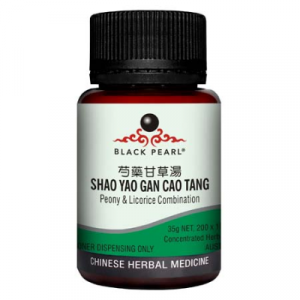
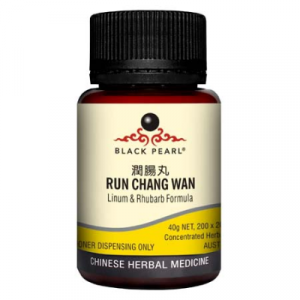
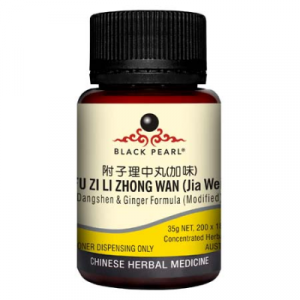


Reviews
There are no reviews yet.